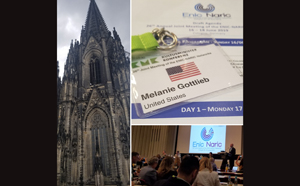
Last month, AACRAO Deputy Director Melanie Gottlieb attended the ENIC-NARIC meeting in Cologne, Germany, where more than 150 participants from Ministries of Education across the European
Higher Education Area met to discuss policy and recognition issues for higher education.
Of particular interest were updates on a variety of projects pertaining to refugees, which we shared in a session entitled "Effective Recognition Measures for Academic, Professional and Social Inclusion of Refugees."
Marina Malgina from ENIC-NARIC Norway and Katrien Bardoel from ENIC-NARIC The Netherlands shared information in the REACT project.
The project began in 2018, and builds on the recently completed Erasmus+ project "Refugees and Recognition," which
developed a common methodological approach to the recognition of refugees’ qualifications. Taking this work a step further, the REACT-project is developing and testing this methodology in major refugee-receiving countries and in cooperation
with higher education institutions. REACT is expected to be completed in 2020.
The aim is to establish a more efficient and consistent approach to the recognition of refugees’ qualifications in Europe. To that end, the REACT project focuses on mobility, employability, and access to further studies for refugees, displaced persons,
and persons in a refugee-like situation – including those without official documentation of their educational background.
"While the crisis is no longer front page news, it's inspiring to see that the work to support access to higher education for displaced students continues to be a focus in the international higher education community," Gottlieb said.
The work of the project is carried out by a consortium that consists of:
There are two main activity sets in the project. The first is the testing and adaptation of the toolkit developed in the previous project, in close cooperation with higher education institutions. The project supports higher education institutions
by identifying best practice cases that illustrate pathways for admission of refugee students to further studies. This work is currently in the testing phase at five refugee-receiving higher education institutions in Syria, Iraq, Afghanistan,
Libya and Eritrea.
The second set of activities focuses on the development of resources. The project team has developed five refugee country briefings and accompanying e-learning modules. The Country briefings and modules are available online for free:
"The millions of displaced persons around the globe remain in need, and that population will continue to grow as the world wrestles with conflict, natural disaster, and climate change" Gottlieb said. "It's crucial for the higher education community to
build the capacity and tools to support and protect access to higher education for now and for the future."